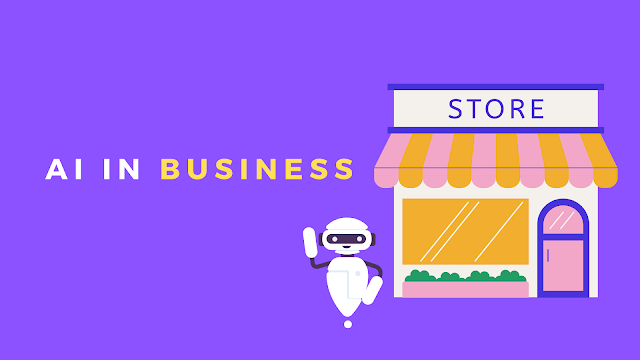AI has the potential to revolutionize a wide range of industries, from healthcare and transportation to finance and manufacturing, by automating tasks, improving efficiency, and providing new insights and capabilities. These processes include learning (the ability to improve performance based on experience), reasoning (using rules to reach approximate or definite conclusions), and self-correction. AI technology is being used in a wide range of applications, from simple tasks such as image and voice recognition to more complex tasks such as decision making, problem-solving, and language understanding.
AI in business refers to the use of artificial intelligence (AI) technology to improve business operations and decision making.
It is important for companies to adopt a strategic approach in implementing AI, by identifying the specific areas where it can add value, and aligning it with the overall business goals and objectives. As the technology continues to evolve, it is essential for businesses to keep themselves updated and adapt to the changes in order to stay ahead of the competition.
The role of artificial intelligence in future technology
Artificial intelligence (AI) is expected to play a major role in shaping future technology. Some of the key areas where AI is likely to have a significant impact include:
Automation: AI-powered automation will continue to improve efficiency and reduce costs in a wide range of industries, from manufacturing and logistics to healthcare and finance.
Predictive Analytics: AI-powered predictive analytics will become even more powerful, enabling businesses and organizations to make more accurate predictions about future events and trends.
Personalization: AI-powered personalization will become increasingly common, allowing products and services to be tailored to individual preferences and needs.
Natural Language Processing: AI-powered natural language processing will continue to improve, enabling more effective communication between humans and machines.
Overall, AI is expected to play an increasingly important role in shaping the future of technology, making it possible to automate complex tasks, analyze large amounts of data, and create personalized experiences.
How Artificial Intelligence is transforming the industry?
Artificial intelligence (AI) is transforming a wide range of industries by automating tasks, improving efficiency and decision-making, and creating new opportunities.
Artificial Intelligence (AI) is revolutionizing various industries by automating tasks, improving decision-making, and creating new opportunities. AI technologies such as machine learning, natural language processing, and computer vision are being used to improve efficiency, productivity and competitiveness. Industries that are likely to benefit the most from AI include healthcare, finance, retail, manufacturing, transportation, cybersecurity, energy, agriculture, marketing and advertising, and education.
AI is being used for tasks such as automating repetitive tasks, predictive analytics, personalization, image and speech recognition, robotics, cybersecurity, healthcare, supply chain management, marketing and advertising, and energy and utilities. As AI technology continues to advance, it is expected to have an even more significant impact on a wide range of industries, creating new opportunities for innovation and growth.
Some benefits of integrating AI in businesses?
Automation of repetitive tasks: AI can automate tasks such as data entry, customer service, and inventory management, freeing up employees to focus on more critical activities.
Enhanced decision-making: AI can analyze vast amounts of data to provide valuable insights and predictions that can inform business strategies and decision-making.
Improved customer service: AI-powered chatbots and virtual assistants can provide 24/7 customer service, increasing customer satisfaction and retention.
Increased efficiency: AI can optimize processes such as supply chain management, logistics, and production, resulting in increased efficiency and cost savings.
Personalization: AI can analyze customer data to personalize products, services, and marketing efforts, resulting in increased sales and customer loyalty.
Which industries will benefit most from AI?
There are many industries that are expected to benefit greatly from the use of artificial intelligence (AI). Some of the industries that are likely to benefit the most include:
Healthcare: AI is being used to assist with diagnostic and treatment decisions, drug development, and clinical research. It is also being used to improve patient outcomes, reduce costs, and increase efficiency.
Finance: AI is being used to improve fraud detection, analyze financial data, and make more accurate predictions about market trends. It is also being used to automate tasks such as risk assessment and compliance.
Retail: AI is being used to personalize recommendations, optimize pricing, and improve supply chain efficiency. It is also being used to improve customer service and sales.
Manufacturing: AI is being used to optimize production processes, predict equipment failure, and improve quality control. It is also being used to reduce costs and increase efficiency.
Transportation: AI is being used to optimize routing and scheduling, improve logistics, and develop self-driving cars.
Energy: AI is being used to optimize energy usage and improve the performance of renewable energy systems.
Agriculture: AI is being used to improve crop yields, optimize irrigation, and reduce waste.
Marketing and Advertising: AI is being used to personalize marketing and advertising efforts, analyze consumer data, and improve ROI.
Education: AI is being used to personalize learning, offer virtual tutoring, and improve student outcomes.
In addition, AI is expected to have a significant impact on other industries such as construction, mining, and logistics. As AI technology continues to advance, it will open up new opportunities for innovation and growth in a wide range of industries.
Conclusion
In conclusion, the integration of Artificial Intelligence (AI) in businesses has the potential to transform the way companies operate and offer new opportunities for innovation and growth. The use of AI in business can improve efficiency, reduce costs, and enhance decision-making by automating tasks and providing valuable insights from data analysis.
However, the implementation of AI in business also raises concerns such as job displacement and data privacy. Therefore, it is crucial for businesses to consider the potential impact of AI on their employees, customers, and society as a whole and put in place regulations and policies that ensure the safe and responsible use of AI.
